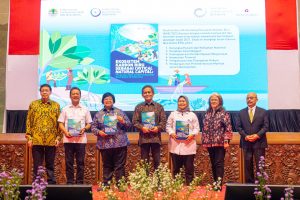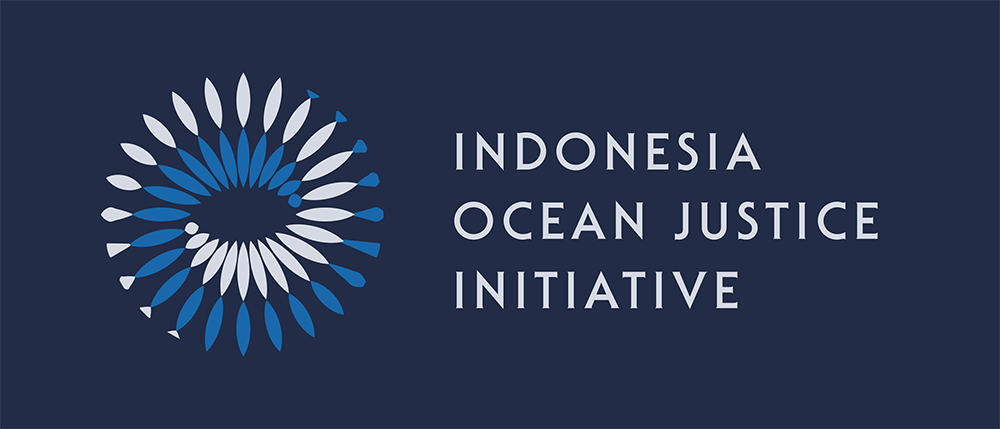Strengthening Blue Carbon Ecosystem Governance in Indonesia
 Jakarta, 30 January 2023 – The Minister of Environment and Forestry of the Republic of Indonesia together with the Minister of Marine Affairs and Fisheries of the Republic of Indonesia deliver keynote speeches at a seminar on the launch of a recent study entitled “Blue Carbon Ecosystem as Critical Natural Capital: Blue Carbon Ecosystem Governance in Indonesia” today (30/1) at the Manggala Wanabakti Building, Jakarta. This seminar is held in collaboration with the Ministry of Environment and Forestry (MOEF) together with the Ministry of Maritime Affairs and Fisheries (MMAF) with the Indonesia Ocean Justice Initiative (IOJI) supported by The Asia Foundation (TAF).
Jakarta, 30 January 2023 – The Minister of Environment and Forestry of the Republic of Indonesia together with the Minister of Marine Affairs and Fisheries of the Republic of Indonesia deliver keynote speeches at a seminar on the launch of a recent study entitled “Blue Carbon Ecosystem as Critical Natural Capital: Blue Carbon Ecosystem Governance in Indonesia” today (30/1) at the Manggala Wanabakti Building, Jakarta. This seminar is held in collaboration with the Ministry of Environment and Forestry (MOEF) together with the Ministry of Maritime Affairs and Fisheries (MMAF) with the Indonesia Ocean Justice Initiative (IOJI) supported by The Asia Foundation (TAF).
The Ministry of Environment and Forestry and the Ministry of Marine Affairs and Fisheries as key stakeholders in the management of Blue Carbon Ecosystem (BCE) in Indonesia continue to make efforts to make Blue Carbon Ecosystem a Critical Natural Capital that must be managed in a sustainable and equitable manner in Indonesia. For this reason, efforts to protect it should be further strengthened based on scientific and transparency principles.
As the owner of 17 percent of the world’s blue carbon reserves, Indonesia has a great opportunity to utilize the Blue Carbon Ecosystem as one of the solutions to tackle climate change. Blue Carbon Ecosystem, which mainly includes mangrove forests, seagrass beds, and salt marshes, has great potential as a carbon sequestration and storage that plays an important role in climate change mitigation efforts. BCE also plays a significant role in climate change adaptation, especially for coastal communities whose living space and livelihoods have the potential to be affected by climate-related coastal risks, such as extreme weather, storm surge, erosion, flood and so on. These risks can result in socio-economic impacts, biodiversity loss, and reduced ecosystem services that have an impact on human and natural survival.
In her remarks, the Minister of Environment and Forestry of the Republic of Indonesia Siti Nurbaya said that the Blue Carbon Ecosystem study which has been prepared by integrating marine ecosystems which includes mangrove forests, seagrass beds, estuaries or brackish water/salt water swamps, and coral reefs, has great potential. as carbon sequestration and storage which plays an important role in climate change mitigation efforts. And on the basis of the ecosystem base, the study sections are very relevant to the FOLU Net Sink 2030 agenda which is our determination as a nation.
“In my view, this will be the direction for our governance related to ecosystem-based carbon, which includes aspects of regulation, institutions, processes, systems and procedures, community participation, financing systems, databases and policy exercise and policy making as well as interactions national (central government) and sub-national (community, private, local government) and especially how coercive and cooperative patterns can be built and maintained well with regard to carbon. In the elaboration such as in terms of roles, pressures, inter-agency mandates, control, implementation assumptions, sources of policy innovation and emphasis on implementation towards Carbon Governance,” said Minister Siti.
Meanwhile, the Minister of Marine Affairs and Fisheries Wahyu Sakti Trenggono said that currently programs related to blue carbon tend to focus only on one type of ecosystem, namely mangrove. He asserted the development of blue carbon in Indonesia also needs to take into account another important blue carbon ecosystem, namely seagrass. Trenggono also explained that blue carbon management in the context of climate change is an important part of two out of the five Blue Economy Policies that are being advocated by the Ministry of Maritime Affairs and Fisheries, namely the expansion of Marine Protected Areas by 30% in 2045 and the Sustainable Management of Coastal and Small Islands.
“By expanding the conservation area to 30%, the seagrass and mangrove ecosystems in the conservation area have the potential to absorb around 188 million tCO2eq,” Trenggono elaborated.
In response to the favorable statement by the two ministers, IOJI CEO Dr. Mas Achmad Santosa, SH., LL.M. added, “Although BCE has great potential in overcoming climate change and improving the welfare of coastal communities, BCE has long been threatened by anthropogenic pressures. When degraded, BCE will switch from a carbon sink to a significant carbon emitter. Degradation also damages the protection of coastal ecosystems and threatens the livelihoods of people who depend on BCE. Therefore, IOJI encourages the Government of Indonesia to include BCE in the Critical Natural Capital category.”
Furthermore, the IOJI CEO reiterated that scientific evidence for BCE role is very crystal clear, namely as an ocean-based solution as well as critical natural capital for our collective fight against climate change, not to mention that BCE is also a source of livelihood for coastal communities. The consequence of designating BCE as CNC means that BCE deserves and must be guarded with strong protection instruments. CNC itself is a major element of the concept or paradigm of sustainable development with an environmental perspective, which is in line with the constitution, especially article 33 paragraph 4 of the 1945 Constitution. This paragraph states that the national economy is organized based on economic democracy with the principles of collectiveness, efficiency, justice, sustainability, with an environmental perspective, independence, and by maintaining a balance of progress and national economic unity.
Meanwhile, the study being launched today was compiled using a normative-empirical method with a comparative approach for one and a half years including interviews, focus group discussions, and field observations in three provinces, namely Bangka Belitung, Riau Islands, and East Kalimantan.
This study examines six elements of BCE governance, namely
1) Legal Framework and National Policy;
2) Institutional Arrangement;
3) Community Participation and Empowerment;
4) Tenurial Security;
5) Supervision and Law Enforcement; and
6) Sustainable Financing and Equitable Distribution of Benefits.
Scientific based policies require good coordination to realize the potential of BCE in contributing to achieving Indonesia’s Nationally Determined Contribution and the Sustainable Development Goals (NDC and SDGs) target, as well as increasing the welfare of blue carbon ecosystem-dependent people. Strong blue carbon ecosystem governance through collaboration and synergy between stakeholders will be a catalyst to ensure a sustainable and equitable future of blue carbon ecosystem.
Recent Posts
- Hari Laut Sedunia Pentingnya Memitigasi Dampak Perubahan Iklim terhadap Masyarakat Pesisir Indonesia
- Deteksi dan Analisis Dugaan Praktik Penangkapan Ikan secara Ilegal di Wilayah Perairan dan Yurisdiksi Indonesia
- Monitoring, Evaluation, and Learning (MEL) Officer
- Penangkapan Kapal Run Zeng 03 dan Kejahatan Lintas Batas Negara Terorganisir dalam Sektor Perikanan Tangkap
- Historic New Coalition of Unions and Civil Society Organizations
